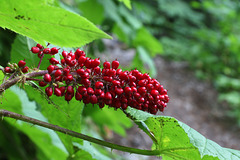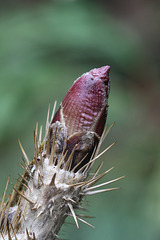RHH's photos with the keyword: devil's club
Devil's Club
| 08 Sep 2015 |
|
|
|
These are the berries of Oplopanax horridus, the Devil's Club or Devil's Walking Stick, so-named for the thorns with which the plant is covered and a common shrubby plant here in the Pacific Northwest. I've posted this, however, for the story that goes with it. I was hiking the Heliotrope Ridge trail with brother Tim who was a bit ahead of me. I stepped up on some mossy (and slippery rocks) to take a picture of these berries and slipped and fell. I rolled across the trail and down the slope on the other side of the trail, all the time trying to protect my camera. My downward progress was arrested by another clump of these plants. Tim, who heard my yell of dismay came running back to help me extricate myself. Apart from a few bumps and bruises I was uninjured except for a lot of thorns in my hands and and arms and legs, thorns I am still trying to get out. Further down the trail I also discovered I had lost my water bottle, a bottle that is merely an old Gatorade bottle wrapped in duct tape (for fixing anything that breaks). Not a great loss in itself, but it has gone with me uncounted years and many miles and I didn't want to lose it. We looked for it and found it in the clump of Devil's Club when we came back down. Even that, however, was not the end of the story. When I was home again and looked at my pictures I had a whole series of blurs among them. I must have had my finger on the shutter as I rolled across the trail and down the hill and they were the result.
Devil's Club
| 05 Feb 2015 |
|
|
|
Devil's Club or Devil's Walking Stick, Oplopanax horridus, is a familiar plant in the Pacific Northwest where it grows in damp and cool forest glades. It is a very large plant, 3-6 feet tall, with large lobed leaves. It is covered, stems and leaves, with the spines from which it gets both its scientific and common names. This is new growth emerging at the end of a stem and it was photographed in Lake Padden Park. The plant, especially the cambium layer, is used medicinally as a tea or as a poultice for a number of different ailments including diabetes and rheumatoid arthritis.
Jump to top
RSS feed- RHH's latest photos with "devil's club" - Photos
- ipernity © 2007-2025
- Help & Contact
|
Club news
|
About ipernity
|
History |
ipernity Club & Prices |
Guide of good conduct
Donate | Group guidelines | Privacy policy | Terms of use | Statutes | In memoria -
Facebook
Twitter


